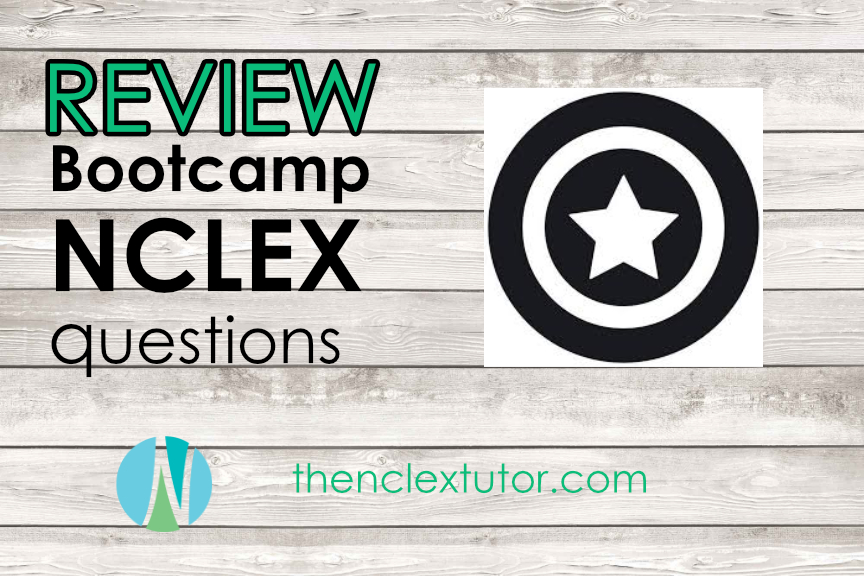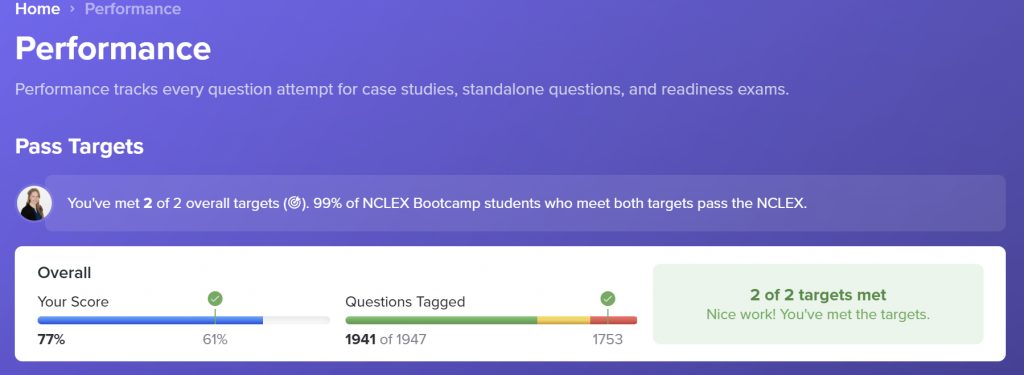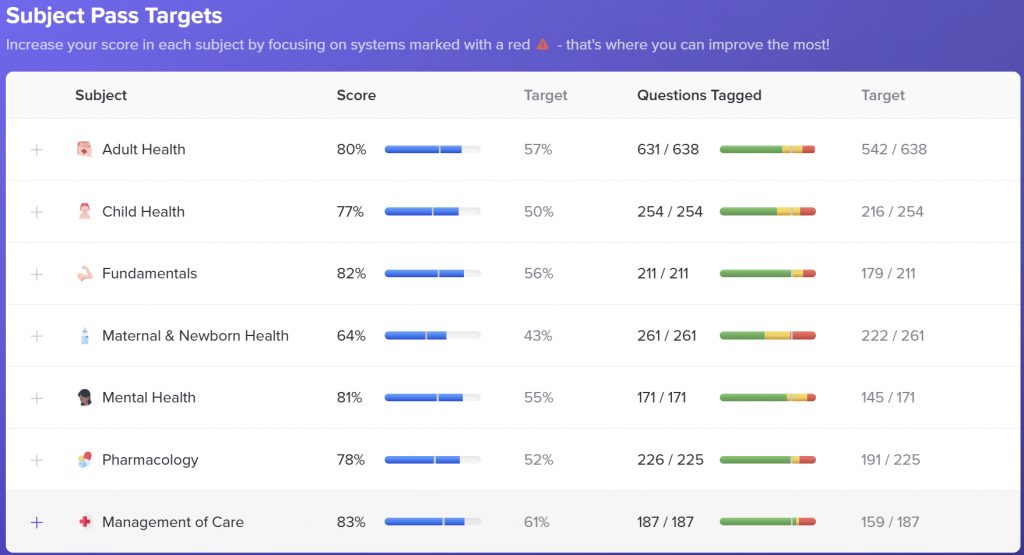Bootcamp NCLEX questions are a very popular resource with nursing students to use for NCLEX prep. I did all the questions (~1950) in 4 months and ended up spending $223.10 for it! For 2 months it costs $99. I wanted to find out if what I heard was true.
DISCLAIMER: This review is Justine Buick’s opinion only and does not represent NCLEX©, NCSBN© or Bootcamp© in any way. No one asked her to do this review. Justine is not getting paid to do this review. Justine only works for her company (KoaPine Tutoring & Test Prep / theNCLEXtutor), and partners only with Brainscape.com. Justine does not use Bootcamp or any other resource during private tutoring sessions. She only uses her own materials.

Are they really that good?
Are the low scores normal for maternity?
Are they really the only resource that was specifically designed for the Next Gen NCLEX?
In this blog post, I go over the pros, cons, show you my scores and offer tips when doing Bootcamp NCLEX questions.
Overview
Bootcamp was started by Dr. Ari Rezaei who worked in dentistry. Then in 2023 NCLEX Bootcamp came on the scene. They were cheaper and looked like they were doing a lot of promo work and so they got very popular with students and my students started saying they had used them or were planning on using them. Dr. Emily WIilson DNP is the co-creator of the NCLEX portion of bootcamp.
Bootcamp has:
- 662 cheatsheats for content review
- countless videos
- 1547 practice questions: included in that are 50 six-question case studies
- Four 100 question readiness exams
- Next Gen course
- Study plan
- Video courses for content – looks like they are adding as they go because it’s not nearly as much as the cheat sheets
The Pros
1. Looks like the real NCLEX exam. This is important because you want to get the feel of the real NCLEX. This will definitely decrease stress when you know what to expect.
2. Easy to use platform. You can break up questions by topic or just do a case study. It’s easy to see your performance and how you compare with others’ scores.
3. The NCLEX-style questions are well written. There are no typos, no inflammatory cultural language (yes, I’ve seen this and it’s not pretty), and no extra fluff in questions. The one-answer and traditional select all that apply questions are written to be “vague”, just like the real NCLEX! Vague just means that the questions are very basic and straight forward, so you want to answer the question without making up crazy exceptions to choose an answer. There were 50 six-question case studies, which was a good number to get lots of practice! The case studies are NOT vague, which actually makes them very good questions. You have tabs to look at for vital signs, history, labs and other pertinent information as the case study unfolds. So far, Bootcamp has the best NCLEX case study questions I’ve seen!
4. Rationales are well written with pictures, video explanations and some cheatsheets for content review. The rationales are not overly medical or too detailed. The rationale just gives you the basic reasons for why the answers are correct or incorrect. It just doesn’t say “that’s incorrect”.
5. Video courses. There are videos about how the NCLEX works and how to break down a case study. They are accurate and easy to understand. There are videos for content review if you need a refresher. I personally would not have my private students use the video courses. Instead, my students use my Nugget NCLEX Book to review content.
6. Four 100-question readiness tests. These tests are separate from the main Q-bank, which I love. I don’t like when a readiness test is put together from whatever questions I have left in a Q-bank. And the tests are all very fair, nothing too crazy and they replicate the real NCLEX even though they are not actually CAT exams (computer adapted tests). As long as the practice test represents the different sections of the test plan, then it doesn’t have to be CAT to be a great practice test.
7. There’s a study plan maker. This is good and bad. I did make a study plan and it’s good because you can move topics around. However, it had me reviewing all the adult health cheat sheets in 30 minutes. But when you go to look at cheat sheets, it would probably be 100’s of pages. So, the content review needs to be more realistic. Which is why I don’t recommend the study plan maker to my current students. I use my own study plan that I made and adapt it to each student.
The Cons
1. Can’t break up question types into the different sections of the test plan. Dr. Emily Wilson (a co-creator of NCLEX Bootcamp) talks about the test plan in a video, but then there’s nowhere to choose topics such as health promotion and maintenance, reduction of risk potential or physiological adaptation. I work with a lot of repeat test takers and when they get the CPR report it tells them where they were below, near and above passing. Some students want to specifically do questions from a specific part of the test plan in order to see if they can consistently get higher scores. This would be great if Bootcamp could add the option of doing questions based on the different domains of the NCLEX Test Plan.
2. The maternity questions are too hard. The target score for maternity is 43%! This is terrible! Why are students doing so bad on maternity/newborn? Seriously, get some easier questions in there. Where are the questions about calculating Naegle’s rule? Signs of pregnancy? Figuring out what stage of labor the lady is in? How much weight gain is normal throughout pregnancy? I get that the maternity/newborn case studies have to be about bad things that are happening like chorioamnionitis, that’s fine. However, I’m not a maternity nurse so maybe I’m missing something here, but they do seem too hard.
3. A few poorly written questions. Every NCLEX prep resource has their problems. I did reach out to the bootcamp team about some of the answers I disagreed about. They weren’t budging on their answers which is very typical. I still disagreed with the answers, but I wasn’t about to get in an email argument. But don’t just take my word that there are poorly written NCLEX style questions out there, science says it happens all the time in this research study. In my opinion, there were phrasing mistakes or symptom answers that were supposed to be immediately concerning but were not any big deal. However, there weren’t very many that I disagreed with.
My Scores
Overall, I got 77% of my questions correct! And for each of the four readiness tests I got “high chance of passing”. It’s VERY possible to get low scores (in the 50’s) and still pass NCLEX as long as you are reviewing basic content and understand that the test is based on SAFETY. So, content and choosing safe answers is key to passing.

My scores for the individual topics were:
- Adult health: 80%
- Child health: 77%
- Fundamentals: 82%
- Maternity/Newborn: 64%
- Mental health: 81%
- Pharmacology: 78%
- Management of Care: 83%

My highest scores were in adult health, fundamentals, management of care and mental health. I’m really good at those “Who Do You Assess First?” types of questions! I’m not a maternity nurse or a pediatric nurse, and I’m not as interested in those topics, and my scores show it. Those topics would be what I need to focus on.
But why don’t I get in the 90%’s consistently? I mean I teach this stuff right?! My biggest issue is that I’m careless. I read too fast and miss important information sometimes. I have to slooooooow down. I always tell my students, “It’s not a race to finish, so slow down.” I try to follow my own advice. I also just don’t know the content sometimes. There will be random topics or things I haven’t studied in a while and I just don’t know. That’s when I use test-taking strategies. They totally help! But I don’t always get it right. Sometimes you really do just need to know the content.
Can I Recommend NCLEX Bootcamp?
Yes, absolutely! NCLEX Bootcamp questions are a solid set of questions to use with your NCLEX prep!
But I do have some tips below. And the biggest one is REVIEW CONTENT before you do a bunch of questions. As I heard Mark Klimek once say, “You can’t apply what you don’t know.”. He’s right! If you don’t know the basic content, it’s really hard to get the question correct. So just make sure to review content before doing the questions.
My students use my nclex nugget pages book and flashcards. Bootcamp does have cheat sheets that you can download and/or print and they have content review videos. I didn’t go through them all but glanced at a couple. They do look organized with lots of pictures and bullet points. It would probably be better if they were offered as a physical book. But when I added that up it was over 600 pages. That’s a big book and something I wouldn’t recommend to my private tutoring students. But you could use them if you just need to brush up on certain topics.
There are other good resources out there such as: Hurst Review, Remar Review, Live Klimek Review or a book like Saunders. Just don’t use too many resources or you’ll get overwhelmed.
Tips
If you do decide to use NCLEX Bootcamp, here are some tips.
1. How many times can I say this?! Study content before doing practice questions. If you don’t know content, then it’s really hard to get the questions correct. So go review the topic first, then go do some questions. For example, if you are working on adult health cardiac, then go review cardiac first.
2. Start your questions by specific topic first. Just cardiac, just endocrine, just management of care. Do 25-50 questions for each topic to see if it’s a topic that you need to brush up on. Then for the second half of all your questions, do a variety of questions.
3. Read the rationale if you get it wrong or don’t understand why you got it correct. If you get it correct and you understand why, then just skip the rationale. And when you get it wrong, write down what you didn’t know.
4. Take the time to finish all your questions and then do the readiness tests last. If you do all the questions, it gives you a lot of practice with applying content. Then after you finish the questions, do the readiness tests.
What should I work on next? Let me know in the comments!